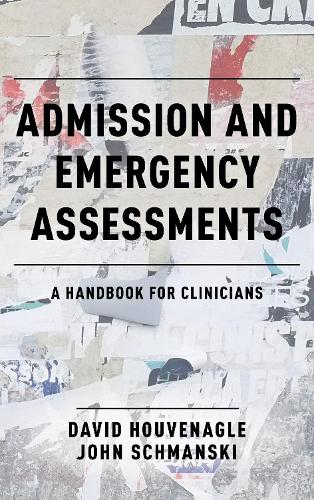
Admission and Emergency Assessments: A Handbook for Clinicians
(Hardback)
Available Formats
Publishing Details
Admission and Emergency Assessments: A Handbook for Clinicians
By (Author) David Houvenagle
By (author) John Schmanski
Bloomsbury Publishing PLC
Rowman & Littlefield Publishers
17th October 2024
United States
Classifications
Tertiary Education
Non Fiction
Psychological testing and measurement
Abnormal psychology
362.1
Physical Properties
Hardback
260
Width 159mm, Height 236mm, Spine 23mm
590g
Description
Admission and Emergency Assessments: A Handbook for Clinicians provides a conceptual framework and concrete practice examples to conduct effective assessments for mental health crises and psychiatric admissions. Behavioral health treatment starts with an accurate and thorough assessment of a clients daily functioning, level of risk, and needs. This assessment serves as the clinicians lens for conceptualizing the patients presentation and aptitude for expressing their problems. Through narrative descriptions, diagrams, and vignettes, this book provides the necessary tools to assess patients in behavioral health crises. It serves as a reference for specific clinical situationsfrom working with translators, busy doctors, and adversarial insurance agencies to assessing a variety of patient dispositions and demographics. This book seeks to elevate and accelerate clinical skills that can be integrated into other practice settings.
Reviews
Admission and Emergency Assessments: A Handbook for Clinicians is an excellent resource for clinical practice, but its major thrust is on clinical assessments. The key areas covered contain requisite information for clinical practitioners who engage in crisis intervention and clinicians who conduct suicide/risk assessments. Furthermore, this book has valuable content related to a therapists comportment during interactions with clients under duress, clients who are psychotic, teenagers, clients under the influence of substances, and so much more. This information is exceptionally important. As the authors point out, high turnover among individuals who conduct level of care assessments is a major problem. This text is a valuable tool that addresses key issues in this area, which could lead to a decrease in the turnover rate by preparing and increasing the skill set of graduate level social workers pursuing this line of work. The approach and tone are pitch-perfect for master's or doctoral students of social work. The pace is just right, and the content is palatable, interesting, and presented in language that can be easily consumed. -- Adrian D. Anderson, Savannah State University
This information is very relevant to the field and I dont recall reading anything very specific to the intake process during my own training. Students need to be prepared when they go into the workforce. The scenarios and educational parts on how to make the best use of the intake time, yet still engage the clients/patients are very useful in the field. I am a seasoned counselor and I appreciated reading this text! -- Carrie Sollin, Adelphi University
The authors Houvenagle and Schmanski have a very easy-to-follow, practice-driven approach to understanding something that is often misunderstood in the clinical world. It reads as though very experienced clinicians are providing supervision to the reader. -- Amy Ward, DSW, LCSW, Virginia Commonwealth University
Author Bio
David Houvenagle, PhD, LCSW, is a board-approved clinical supervisor in the state of Kentucky. He has thirty years of professional experience in outpatient, partial hospitalization, intensive outpatient, inpatient hospitalization, and assessment settings. His previous published works include Local Healthcare Politics: Louisvilles Growth Machine 19472007 and Clinicians Guide to Partial Hospitalization and Intensive Outpatient Practice.
John Schmanski, M.Ed, LPC is a behavioral health case manager for an insurance company. His experience in the behavioral health field spans fifteen years. As an assessment clinician at a psychiatric hospital, he evaluated patients for more than a decade and trained novice clinicians, and he has experience in inpatient and outpatient mental health settings.
